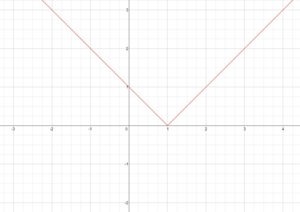Science:Math Exam Resources/Courses/MATH110/April 2013/Question 01 (c)/Solution 1
The statement is false.
A minimum always occurs at a critical point - however, there are two possible reasons for a critical point: either or does not exist. In this second case, the derivative is not equal to zero, but there can still be a local minimum. For example, the derivative does not exist if there is a cusp (sharp corner), a vertical tangent or the function is discontinuous; an example of a cusp is given below:
In this case there is a minimum at x = 1 but does not exist, so it can't be equal to zero. So we found a counter example and hence the statement is false.


